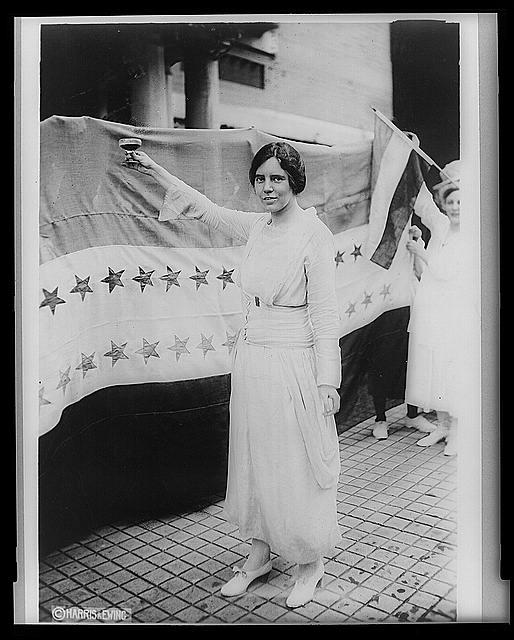Alice Paul (1885-1977)
Women's suffrage leader Alice Paul raises a glass in front of the suffragists' banner in celebration to the ratification of the 19th amendment on August 26, 1920. The amendment granted women the right to vote. The battle for women's suffrage took about a hundred years beginning in the 1800s. Paul was at the forefront of the second wave (1890-1919).
Born on January 11, 1885 in Mount Laural, New Jersey, Paul's parents exposed her to women's suffrage and gender equality. Paul was part of the National Woman's Party (NWP) and organized the "Silent Sentinels", which were a group of women who stood outside of the White House with banners that urged statesmen and the president to give women the right to vote. After the suffragists' victory, Paul did not stop her advocacy for equal treatment. In 1922 she drafted the Equal Rights Amendment, which would later be fought for about fifty years later.
If you'd like to know more about Alice Paul go to:
https://www.pbs.org/wgbh/americanexperience/features/wilson-alice-paul/
http://www.alicepaul.org/who-was-alice-paul/
https://www.womenshistory.org/education-resources/biographies/alice-paul

[Alice Paul, full-length portrait, standing, facing left, raising glass with right hand]. 1920. Photographic Print. Library of Congress: Prints and Photographs Division. https://www.loc.gov/item/97500088/ (Accessed December 7, 2018).
Public Domain
Public Domain is a copyright term that is often used when talking about copyright for creative works. Under U.S. copyright law, individual items that are in the public domain are items that are no longer protected by copyright law. This means that you do not need to request permission to re-use, re-publish or even change a copy of the item. Items enter the public domain under U.S. copyright law for a number of reasons: the original copyright may have expired; the item was created by the U.S. Federal Government or other governmental entity that views the things it creates as in the public domain; the work was never protected by copyright for some other reason related to how it was produced (for example, it was a speech that wasn't written down or recorded); or the work doesn't have enough originality to make it eligible for copyright protection.
Add a comment
PLEASE NOTE: NCpedia provides the comments feature as a way for viewers to engage with the resources. Comments are not published until reviewed by NCpedia editors at the State Library of NC, and the editors reserve the right to not publish any comment submitted that is considered inappropriate for this resource. NCpedia will not publish personal contact information in comments, questions, or responses. If you would like a reply by email, note that some email servers, such as public school accounts, are blocked from accepting messages from outside email servers or domains. If you prefer not to leave an email address, check back at your NCpedia comment for a reply. Please allow one business day for replies from NCpedia. Complete guidelines are available at https://ncpedia.org/about.